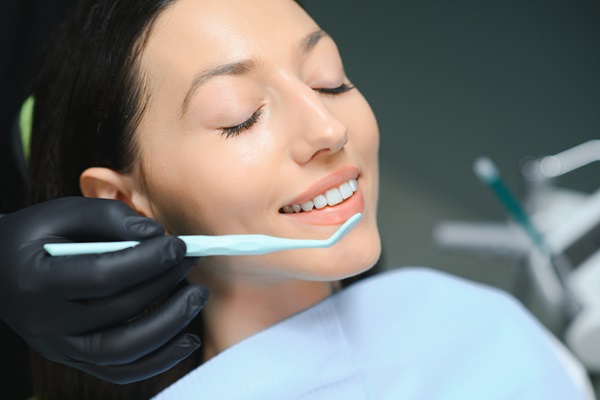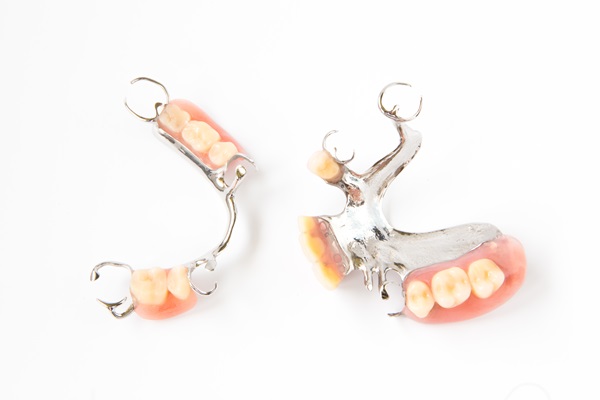 Dentures are a popular solution for individuals who are missing any number of natural teeth. These prosthetic teeth can dramatically improve oral function and appearance, though first-time wearers report various challenges adjusting to new dentures that dentists can address.
Dentures are a popular solution for individuals who are missing any number of natural teeth. These prosthetic teeth can dramatically improve oral function and appearance, though first-time wearers report various challenges adjusting to new dentures that dentists can address.
What do most new denture wearers typically experience?
Most new denture wearers require about one month to adjust to the sensations accompanying a foreign substance in the mouth. Common symptoms that most people experience include:
- Changed facial expressions
- Difficulty speaking and eating
- Excessive saliva production
- Gum and oral tissue irritation
What are some tips for adjusting to new dentures?
Most people eventually adjust to wearing dentures. Still, although most uncomfortable symptoms resolve naturally, dentists can offer four helpful tips to help patients manage those that pose the most significant frustration.
1. Read and sing aloud
Many new denture wearers are unable to pronounce words they previously mastered. For example, words with specific letters may be particularly challenging because dentures sit in the mouth differently than natural teeth, interfering with the tongue's placement while speaking. Eventually, the mouth repositions naturally, but dentists recommend reading aloud to help patients become conscious of the adjustments necessary to produce various sounds. Singing is also helpful because it promotes slow enunciation that allows the mouth to sustain correct positioning.
2. Exercise facial muscles
Dental patients often exhibit unwanted facial expressions while adjusting to new dentures. Facial movements may change when the muscles and lips attempt to reposition around prosthetic teeth. Also, new dentures necessitate using different facial muscles than those that move around natural teeth. Activating new muscles can be strenuous and promote hypersalivation along with unusual facial expressions. Dentists may recommend exercises to strengthen the cheek muscles, even before installing dentures. Doing so helps prevent exaggerated facial movements as patients strain to use weak or previously dormant muscles while speaking or eating.
3. Stay hydrated
Anyone who wears dentures for the first time may experience some mouth soreness during the adjustment period. Although severe discomfort may indicate the need to resize poorly fitting dentures, most soreness resolves quickly as patients naturally avoid movements that cause friction. Still, it is advisable to address oral abrasions promptly. Dentists also recommend drinking lots of water to hydrate the mouth and prevent dryness that makes delicate oral tissue susceptible to damage. In addition to relieving tender spots in the mouth, adequate hydration discourages the growth of oral bacteria, which can compromise dentures and lead to gum disease.
4. Plan meals
Dentures primarily function to improve chewing ability, but many new wearers find that eating is challenging. Dentists advise patients to eat soft, room-temperature foods like eggs and yogurt and avoid hard and sticky foods, like apples and candy, immediately after receiving new dentures to reduce the chewing force that irritates sensitive gums. Also, choosing food-softening cooking methods like steaming, and cutting food into small bites to chew using both sides of the mouth, can help patients transition to eating solid foods.
Conclusion
Anyone adjusting to new dentures should know that some discomfort is normal, but it is not permanent. A dentist can offer helpful tips to ensure that anyone who wears dentures has a positive experience.
Request an appointment or call San Dimas Family and Sedation Dentistry at 909-305-2300 for an appointment in our San Dimas office.
Recent Posts
Adjusting to new dentures is a process that usually takes several weeks. You must learn how to eat, speak, and adapt to the feel of having them in your mouth. Though every effort is made to have your dentures fit correctly when they are made, you are likely to need to visit your dentist for…
Most first-time denture candidates are nervous about adjusting to new dentures. They usually do not know what to expect, and they may wonder if dentures will feel natural.People get dentures for many reasons, such as broken or missing teeth, excessive tooth decay, gum disease, severe tooth pain or trauma, and painful sensitivity to hot and…
Getting new dentures can be a simultaneously exciting and daunting process. Although adjusting to new dentures takes some time and work, patients can immediately begin to enjoy the positive results of a full smile and a more rounded-out face. However, some aspects of adjustment may require a bit more practice. Chewing becomes somewhat different with…


